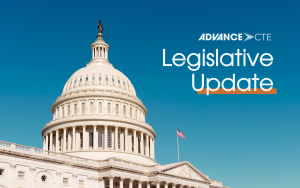This week, lawmakers have continued to struggle to find consensus on federal funding for the upcoming 2026 fiscal year (FY26). Elsewhere, the U.S. Department of Education (ED) proposes new priorities for discretionary grants, and is soliciting feedback regarding the future of the Institute for Education Sciences.
Congress Remains Deadlocked Over Funding
Federal government funding is set to expire October 1– the formal start to the new 2026 federal fiscal year. Despite this fast approaching deadline, lawmakers on Capitol Hill have continued to struggle to reach consensus on a pathway forward for federal funding beyond this date. Due to this current impasse, a government shutdown is possible within days without further legislative action.
Late last week, the Senate rejected two temporary, stopgap funding proposals– known as a continuing resolution (CRs)– which would extend existing federal funding for a short period of time as lawmakers continue to negotiate much-needed full-year appropriations legislation for federal initiatives and programs like the Carl D. Perkins Career and Technical Education Act (Perkins V). These CRs included a measure passed narrowly by the House which would have extended funding through November 21. The Senate rejected both this House bill and a separate Democratic counteroffer for funding through October 31. The dispute centers on healthcare subsidies that Democrats want included in exchange for their support which is needed in the Senate to overcome the chamber’s filibuster threshold. Congressional Republicans and the Trump administration have continued to reject these demands.
This week, President Trump canceled a scheduled meeting with Senate Minority Leader Chuck Schumer (D-NY) and House Minority Leader Hakeem Jefferies (D-NY) to discuss these issues in further detail. At present, both chambers remain in recess through early next week, increasing the risk of a government shutdown as the October 1 deadline approaches.
Advance CTE is monitoring these developments closely and will continue to communicate information as it becomes available to the wider CTE community.
Discretionary Grants for Career Pathways Unveiled
Yesterday, ED published a proposed discretionary grant priority focused on career pathways and workforce readiness. Under the proposed priority and definitions, federal discretionary grant programs would be encouraged to invest in projects that strengthen the connection between education and meaningful career outcomes. These priorities are intended to be used as criteria for ED’s future grantmaking and help align ED’s activities with the Trump administration’s wider priorities.
The newly proposed priority focuses on aligning education with workforce needs. It encourages states and institutions to expand career-connected learning, apprenticeships, and credentialing systems so that students graduate better prepared for high-demand jobs and are positioned for longer-term economic mobility.
Read the proposed priority here. ED is actively soliciting feedback from the public regarding this proposal which will be due in the next 30 days.
Senate Holds HELP Hearing
Last week, the Senate Health, Education, Labor and Pensions (HELP) Committee held a hearing on the State of K-12 Education, convening a panel of researchers, state leaders, and educators to provide testimony. The discussion centered on declining achievement, reflected in lower test scores, and widening achievement gaps, as measured in math and reading assessments through the National Assessment of Educational Progress (NAEP), also known as the Nation’s Report Card. Witnesses identified multiple contributing factors, including long-standing declines that predated the pandemic, the rise of smartphones and social media, and persistent teacher shortages.
Sen. Jon Husted (R-OH) emphasized the importance of investing in career centers and resources to help each high school graduate become career-ready. The hearing underscored both the urgency of the nation’s K-12 challenges and the potential of evidence-based reforms, community partnerships, and innovative approaches to better prepare students for the future. Click here to watch the full hearing.
Odds & Ends
- ED is currently requesting feedback on redesigning the Institute of Education Sciences (IES). Feedback could inform future priorities, research, and funding decisions; click here to submit comments.
- ED is also proposing a new discretionary grant priority to promote “meaningful” education, aiming to align the Department’s future grantmaking to ensure student access to rigorous and engaging academic experiences. Click here to read the proposed rule.
Rob Young, Communications & Advocacy Associate
Steve Voytek, Policy Advisor


